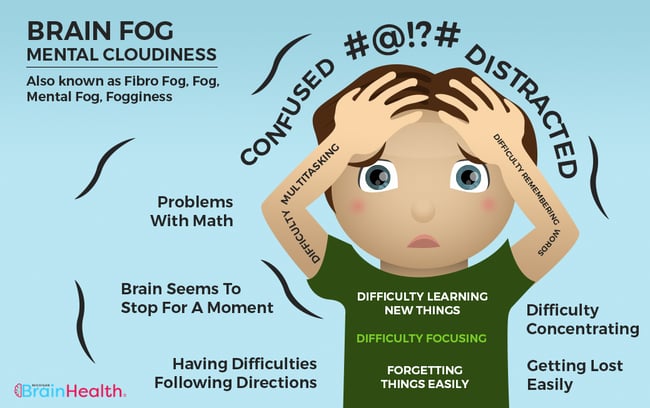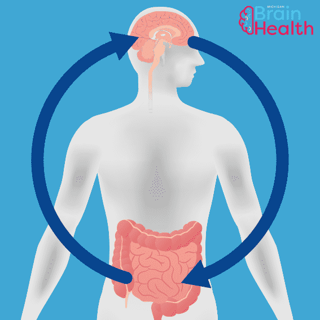Are you spaced out all the time? 5 reasons for brain fog:

Do you feel spaced out all the time? Like you’re moving in slow motion through a fog and can’t snap out of it?
Though it’s not considered a disorder worth a doctor’s visit, brain fog is nevertheless distressing, disorienting, and difficult to cope with.
It’s also a red flag your brain is aging too quickly and that you should take action right away.
When your neurons, or brain cells, don’t communicate well with another, this causes brain fog. This poor communication causes overall brain function to slow down and diminish, giving you symptoms of brain fog. The trick is to find out why those neurons aren’t communicating well with one another.
A number of reasons, both metabolic (having to do with diet and lifestyle) and neurological contribute to brain fog. In a nutshell, neurons need sufficient fuel, oxygen, and stimulation to function and prevent brain fog.
5 Possible Factor Contributing to Brain Fog:
1. Blood sugar that is always too low or too high:
Chronically unstable blood sugar is a common cause of brain fog because it means neurons are not receiving enough energy to function. As a result, they communicate poorly, causing brain fog.
The most common reasons for unstable blood sugar include a diet high in processed carbohydrates and sugars, skipping meals, and chronic overeating.
Low blood sugar symptoms: Nausea or no appetite in the morning, wake up at 3 or 4 a.m., lightheaded, irritable, spacey and/or low energy between meals, feel energized after meals (there should be no change in energy).
High blood sugar symptoms: Fatigue after meals, constant hunger, intense craving for sweets after meals, constant thirst, frequent urination, insomnia, and excess abdominal fat.
For some people, banishing brain fog is as easy as stabilizing blood sugar through a whole foods diet of ample vegetables along with healthy proteins and fats. Moderate your carbohydrate intake to avoid low or high blood sugar.
2. An unhealthy gut environment:
 Because of the strong communication between the gut and the brain, poor gut health has a profound influence on brain health. Symptoms can include not only brain fog, but also depression, anxiety, irritability, and worsened memory and learning.
Because of the strong communication between the gut and the brain, poor gut health has a profound influence on brain health. Symptoms can include not only brain fog, but also depression, anxiety, irritability, and worsened memory and learning.
Some people notice their brain fog kicks in after they eat foods that trigger an immune reaction, such as gluten or dairy. Bloating, gas, constipation, or diarrhea can also play a role in brain fog.
Additionally, when the lining of the small intestine becomes inflamed and damaged, it allows undigested foods and pathogens to escape into the bloodstream where they trigger inflammation and brain fog. This is known as leaky gut, or intestinal permeability.
3. Poor circulation:
If your fingers and toes are always freezing and your nose is cold to the touch, poor circulation may play a role in your brain fog. These are signs of poor circulation in the brain as well. Other symptoms of poor circulation include weak nails, chronic fungal nail infections, low brain endurance, and cramping in the hands and feet.
Poor circulation deprives the brain of oxygen and nutrients, thus causing brain fog. Factors that contribute to low circulation include anemia, chronic stress, Hashimoto’s hypothyroidism, low blood pressure, smoking, and blood sugar imbalances.
4. Brain Inflammation:
Elevated homocysteine levels indicate that there is inflammation in the brain. If homocysteine levels are elevated it indicates that your body has a reduced ability to methylation.
This can happen due to genetic factors as well as exposure to certain environmental toxins. A reduction in methylation not only leads to brain fog, but can also create symptoms of depression, anxiety, and chronic fatigue. If homocysteine levels are elevated above 10 it warrants genetic testing.
5. Functional neurology mechanisms of brain fog:
A head injury can inhibit function anywhere in the brain. Because all the parts of the brain work together, this can affect overall function causing a myriad of symptoms, including brain fog.
Unrelated to an injury, degeneration or dysfunction in one or more areas of the brain cause poor firing of neurons.
Or, perhaps one side of the brain is more dominant than the other. This imbalance can skew brain function and performance, causing a wide range of symptoms that may include brain fog.
In functional neurology, we look at not only the metabolic factors of the brain but also at how different areas of your brain function.
Strategies that dampen or activate different areas as needed can be a useful tool in alleviating brain fog.
Got brain fog? Ask my office for more advice about how to manage it so you can feel and function your best. Call 586-731-8840.
Always remember one of my mantras., "The more you know about how your body works, the better you can take care of yourself."
For more details about the natural approach I take with my patients, take a look at the book I wrote entitled: Reclaim Your Life; Your Guide To Revealing Your Body's Life-Changing Secrets For Renewed Health. It is available in my office or at Amazon and many other book outlets. If you found value in this article, please use the social sharing icons at the top of this post and please share with those you know who are still suffering with chronic health challenges, despite receiving medical management. Help me reach more people so they may regain their zest for living! Thank you!
ALL THE BEST – DR. KARL R.O.S. JOHNSON, DC – DIGGING DEEPER TO FIND SOLUTIONS



